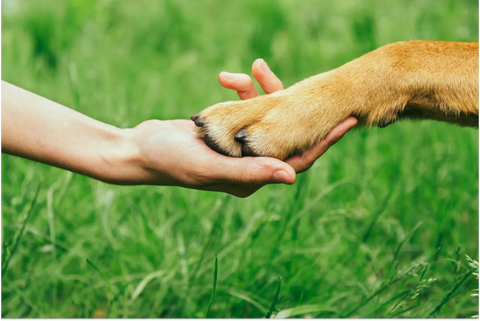
Can Dogs Sense Pregnancy? The Power of Pack Connection
Table of Contents
- How Sensitive Are Dogs' Senses?
- Can Dogs Sense Hormonal Changes?
- Behavioral Changes in Dogs
- Changes During Pregnancy That Dogs May Notice
- Preparing Your Dog for the Arrival of a Newborn
- Possible Behavioral Changes in Dogs
- Fostering Positive Interactions Between Your Dog and Baby
- Can Dogs Sense Pregnancy?
Dogs and humans have shared a profound and intricate bond since time immemorial. This bond is not solely based on companionship but also on a deep-rooted understanding and empathy that often seems to surpass the boundaries of species.
Dogs have been known to display an uncanny ability to sense our emotions and health conditions, but can they sense something as complex as pregnancy in humans?
Let’s explore the various facets of a dog's extraordinary senses and how these might enable them to detect changes in their owner's physical and emotional state during pregnancy. Drawing upon scientific studies, expert insights, and compelling anecdotes, we will aim to unravel the truth behind the belief that dogs can indeed sense pregnancy.
How Sensitive Are Dogs' Senses?
Dogs' senses, particularly their sense of smell, are incredibly powerful. A dog's sense of smell is estimated to be between 10,000 to 100,000 times more sensitive than ours. This exceptional olfactory capability allows them to detect subtle changes in scent, often undetectable to humans.
This sensitivity and their ability to perceive pheromones — the chemical signals animals release — might play a crucial role in detecting hormonal changes in a pregnant owner. A dog's hearing is also far superior to ours, able to hear frequencies ranging from 40 Hz to 60,000 Hz compared to a human's range of 20 Hz to 20,000 Hz.
Dogs can not only hear more sounds than we can, but they can also hear them at a much greater distance. This acute sense of hearing may allow dogs to perceive changes in their owner's heartbeat or breathing patterns during pregnancy, further alerting them to the changes occurring within their human companion.
Moreover, dogs are exceptionally sensitive to emotional changes in their humans. They can read our moods through subtle cues and body language and often react empathetically to our emotions.
For instance, many dog owners have reported that their pets seem to instinctively know when they're feeling sad or stressed and will often try to provide comfort. This emotional sensitivity could be another key factor enabling dogs to sense pregnancy, as expectant mothers undergo various emotional changes throughout gestation.
In the next sections, we'll dive deeper into these aspects, exploring the possibilities and evidence surrounding the intriguing concept of dogs sensing pregnancy.
Can Dogs Sense Hormonal Changes?
The unique physiological state of pregnancy involves numerous hormonal changes in the human body. Some of the most notable hormones that see a surge during pregnancy are human chorionic gonadotropin (hCG), progesterone, and estrogen.
These hormones are critical for maintaining pregnancy and preparing the body for childbirth, and they also bring about numerous physical changes in expectant mothers. Given dogs' incredible sense of smell and their ability to perceive pheromones, there's a possibility that they may detect these hormonal changes.
Dogs have a specialized organ known as the vomeronasal organ, or Jacobson's organ, that enables them to detect pheromones and other chemical signals not picked up by the main olfactory system. This organ might allow dogs to sense the hormonal fluctuations in a pregnant woman's body.
While this seems plausible, no scientific research currently validates the claim that dogs can smell hormonal changes linked to pregnancy. Thus, while anecdotal evidence suggests dogs may react to their owner's pregnancy, we can't definitively say it's due to their detection of hormonal changes.
Behavioral Changes in Dogs
Many dog owners report noticeable changes in their pets' behavior when they're pregnant. These changes vary greatly among dogs, with some becoming more protective and others seemingly more affectionate.
Some dogs may even act differently, showing signs of stress or anxiety, possibly because they sense a change but can't quite understand what it means.
- Increased Protectiveness: Some dogs may become more protective of their pregnant owners, always staying close to them and displaying signs of guarding behavior. This could be a response to the perceived vulnerability of the owner during pregnancy.
- Increased Affection: Other dogs may display increased affection, often nuzzling their owner's belly or spending more time by their side than usual. This might be their way of offering comfort and companionship during this physically and emotionally demanding time.
- Signs of Stress or Anxiety: In some cases, dogs may exhibit signs of stress or anxiety, including increased restlessness, whining, or changes in eating and sleeping patterns. This could be due to the changes they sense in their environment but can't quite understand.
It's crucial to remember that while these behaviors might suggest that dogs sense pregnancy, they're not definitive proof. Just as humans react differently to changes in their environment, so too do dogs.
Therefore, these behavioral changes may not be directly linked to the owner's pregnancy but to other factors such as changes in routine, emotional state, or even the owner's increased attention to their own bodily changes.
Changes During Pregnancy That Dogs May Notice
During pregnancy, various physical and emotional changes occur that dogs may pick up on. Let's look at some of these changes in more detail:
- Physiological Changes: As your body changes throughout pregnancy, your scent may change due to hormonal fluctuations. Dogs have a keen sense of smell, many times stronger than ours, and they may notice these subtle changes in your body odor.
- Changes in Behavior: Pregnancy can lead to changes in behavior and routine, such as altered sleep patterns, increased frequency of bathroom visits, or a shift in your daily routine. Dogs are observant creatures and are likely to pick up on these changes.
- Emotional Changes: Dogs are known to be empathetic and can often sense their owner's emotional state. The emotional changes that come with pregnancy, whether it's excitement, anxiety, or mood swings, could be perceptible to your dog.
- Physical Activity Levels: As the pregnancy progresses, physical discomfort may reduce your activity levels. If your dog is used to regular exercise with you, they might notice if these activities decrease.
- Preparation for Baby's Arrival: The physical preparation for a new baby, such as setting up a nursery, could also alert your dog that change is afoot. This includes moving furniture, the presence of new items (like a crib or stroller), or changes in the layout of your home.
Every dog's sensitivity to these changes may vary. The key is to ensure they're given ample attention and reassurance during this period of change. Dogs are highly adaptable, and with proper support, they can smoothly transition into welcoming the new family member.
Preparing Your Dog for the Arrival of a Newborn
Regardless of whether dogs can sense pregnancy, it's a fact that the arrival of a new family member will bring significant changes to your household.
These changes can be confusing and stressful for your dog if not managed appropriately. Therefore, preparing your dog for this major transition should be part of your pre-baby preparations.
- Gradual Changes: Start by making gradual changes to your dog's routine. If your dog's feeding, walking, or sleeping schedule will need to change once the baby arrives, start implementing these changes early so your dog can adjust.
- Desensitize to Baby Sounds and Smells: To help your dog adjust to the new sights and sounds a baby will bring, gradually introduce them to baby-related items, sounds, and smells. This could include playing recordings of a baby crying, introducing baby furniture into your home, or applying baby lotion to your hands before petting your dog.
- Obedience Training: If your dog isn't already trained in basic commands, now is a great time to start. Commands such as “sit,” “stay,” and “leave it” can be particularly helpful when managing interactions between your dog and baby.
- Restricted Areas: If there will be areas in your home that will be off-limits to your dog once the baby arrives, start training your dog to understand these boundaries now.
Possible Behavioral Changes in Dogs
It's crucial to keep an eye out for any significant behavioral changes in your dog during your pregnancy. Changes in a dog’s behavior are more likely to be related to changes in the environment or their owners' behavior rather than a direct response to sensing pregnancy.
- Increased Affection or Closeness: Some dogs may seem more affectionate or protective of their pregnant owners, perhaps because they sense a change or simply because their owner is spending more time at home.
- Anxiety or Stress: Any changes in routine, environment, or behavior of family members (including increased stress levels in the owner) can potentially cause stress or anxiety in dogs. Signs may include changes in appetite, destructive behavior, or excessive barking or whining.
- Change in Activity Levels: Some dogs may become more active, perhaps picking up on increased activity levels in the household. Conversely, others may become more lethargic, especially if their exercise routines are disrupted.
If you notice any significant behavioral changes in your dog during your pregnancy, it's a good idea to consult with a vet or a professional dog behaviorist. They can provide guidance and resources to help manage these changes and ensure a smooth transition for your dog with the arrival of your new baby.
Fostering Positive Interactions Between Your Dog and Baby
When the baby arrives, fostering positive interactions between your dog and the new addition to your family is essential. This helps ensure peaceful coexistence and strengthens the bond between them.
Here are some strategies:
- Introducing the Scent: Before bringing the baby into the house for the first time, introduce your dog to the baby's scent. This can be done by bringing an item of the baby's clothing or a blanket for the dog to sniff.
- Supervised Interactions: Always supervise interactions between your dog and your baby. Never leave them alone together, even if your dog is generally well-behaved and gentle.
- Positive Associations: Help your dog associate the baby with positive experiences. For example, give your dog treats, praise, or petting when the baby is around.
- Personal Space: Ensure that both the baby and the dog have their own personal spaces where they can retreat if they feel uncomfortable or need rest.
Can Dogs Sense Pregnancy?
Since dogs are unable to state what they think or are sensing verbally, it can’t be proven that dogs can or can’t sense pregnancy. What many dogs can do is sense even the most mild changes in their owner or handler, such as increases in stress or changes in hormone levels.
While there is no definitive scientific evidence, numerous anecdotal accounts suggest that some dogs may detect changes related to pregnancy. More importantly, however, dogs can certainly sense changes in their environment and routine, so it's important to prepare them for the arrival of a new baby to minimize stress and confusion. Finally, whether or not they can sense pregnancy, dogs often provide invaluable companionship and emotional support to their owners during this significant period of change.
For more tips, tricks, and training guides for your furry friends, check out A Pup Above, a leader in fresh dog and cat foods.
Sources:
How Dogs Use Smell to Perceive the World | VCA Animal Hospital
Sounds Only Dogs Can Hear: Higher Pitches Is Where They Shine | AKC
Human Chorionic Gonadotropin - StatPearls | NCBI
Top Stories

Why Do Dogs Lick Their Paws?

Why Do Dogs Whimper & Make Noises in Their Sleep?

Healthy Vet-Approved Homemade Dog Food Recipes

How To Cook Sweet Potatoes for Dogs






















